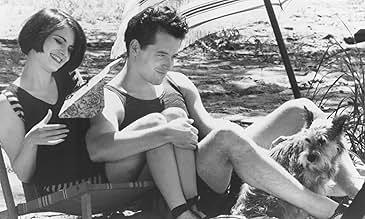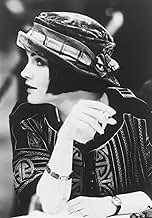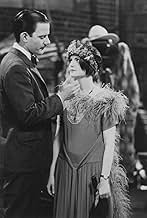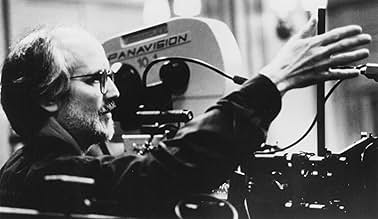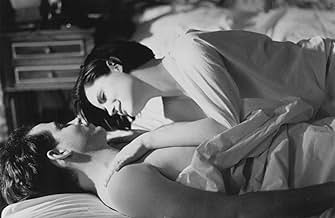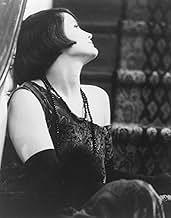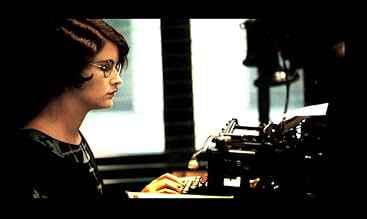VALUTAZIONE IMDb
6,4/10
5027
LA TUA VALUTAZIONE
Aggiungi una trama nella tua linguaDorothy Parker remembers the heyday of the Algonquin Round Table, a circle of friends whose barbed wit, like hers, was fueled by alcohol and flirted with despair.Dorothy Parker remembers the heyday of the Algonquin Round Table, a circle of friends whose barbed wit, like hers, was fueled by alcohol and flirted with despair.Dorothy Parker remembers the heyday of the Algonquin Round Table, a circle of friends whose barbed wit, like hers, was fueled by alcohol and flirted with despair.
- Regia
- Sceneggiatura
- Star
- Premi
- 2 vittorie e 8 candidature totali
James Le Gros
- Deems Taylor
- (as James LeGros)
Recensioni in evidenza
While watching this film last night on IFC, I found myself appreciating the social, historical and artistic subject matter. Despite Mrs. Parker's obvious and overwhelming psychological dysfunctions, I felt this was a genuine "true to life" expression of one participant's subjective experiences. This was a unique, if not quite legendary, circle of literary talent -- certainly deserving of serious cinematic treatment such as this.
BUT....
There was another side to the story -- a healthier, less appalling, less depressing side. To discover "the rest of the story", I highly recommend Harpo Marx' autobiography "Harpo Speaks". Although Harpo also recalls the scathing insults and practical jokes that were a central part of the story of this Round Table group, his book relates a number of hugely funny and sometimes heart-warming scenes that indicate that at least some of these people truly cared for each other and expressed strong positive feelings in many different settings. In short, Harpo's stories (e.g. several "croquet fanatic" episodes) offer a telling comedic counterpoint to Mrs. Parker's almost continually cynical and self-pitying pathos. Read Harpo's book to balance out the negative. You'll be glad you did.
BUT....
There was another side to the story -- a healthier, less appalling, less depressing side. To discover "the rest of the story", I highly recommend Harpo Marx' autobiography "Harpo Speaks". Although Harpo also recalls the scathing insults and practical jokes that were a central part of the story of this Round Table group, his book relates a number of hugely funny and sometimes heart-warming scenes that indicate that at least some of these people truly cared for each other and expressed strong positive feelings in many different settings. In short, Harpo's stories (e.g. several "croquet fanatic" episodes) offer a telling comedic counterpoint to Mrs. Parker's almost continually cynical and self-pitying pathos. Read Harpo's book to balance out the negative. You'll be glad you did.
I am a fan of many of the writers who flit in and out of this movie, but I confess I don't know much about their personal lives and habits (except perhaps for Benchley, and Thurber who is only barely mentioned in this film). This film gives the viewer a good sense of what it must have been like to be part of the wildly creative crew that surrounded the legendary Algonquin Round Table, but a very confused picture of Dorothy Parker's life. Only someone who already knows her story, and can keep her various husbands and lovers in order, can piece this mish-mash together. And none of the performers are strong enough to seem like anything more than walk-ons dressed as famous people. (The "gang" scenes work because of the fast pacing; the movie drags when we spend time with the individuals.) According to comments recorded here, Miss Leigh is doing a good vocal impression of Dorothy Parker. Maybe so (I've never heard Parker), but Leigh's delivery is so totally annoying that it's enough to drive the AUDIENCE to suicide. Is she trying to do Hepburn on downers? Sometimes her mannered accent veers toward Transylvanian.
Throughout the movie, Parker herself denigrates her little "doodad" poems, but that's all the film offers us of her creative output. We never really find out about the contents of her books and plays, and how she ended up in Hollywood (and what she wrote there). After a few of her doggerel verses, they become trite. I began to wonder if people think these poems are funny because they know they're SUPPOSED to be funny.
I'm sure there's probably a good movie in Mrs. Parker's life, but I don't think this is it.
Throughout the movie, Parker herself denigrates her little "doodad" poems, but that's all the film offers us of her creative output. We never really find out about the contents of her books and plays, and how she ended up in Hollywood (and what she wrote there). After a few of her doggerel verses, they become trite. I began to wonder if people think these poems are funny because they know they're SUPPOSED to be funny.
I'm sure there's probably a good movie in Mrs. Parker's life, but I don't think this is it.
I think that this film was meant to be realist and naturalistic. However,there is the reality that this is an entertainment, and the audience has to hear and understand the lines. Supervigilance is required to do this in this movie. Not only does JJL's imitation of Dorothy Parker's speech affectations make the speech and musing of the main character difficult to understand, but the inclusion of background noise, overlapping dialog, and frequent muttering and mumbling of the performers make every character difficult to even hear, much less understand.
Since so much of this movie is about legendary people mouthing famous aphorisms, it is frustrating to only hear snippets of their lines. I suppose the idea was to toss these famous lines away to add naturalism. However, without spotlighting the conversations of the legendary characters, however contrived this might be performed, this is just a very sad movie about a bitter, unhappy, self-destructive, unproductive writer. Not very easy to watch nor very interesting.
Since so much of this movie is about legendary people mouthing famous aphorisms, it is frustrating to only hear snippets of their lines. I suppose the idea was to toss these famous lines away to add naturalism. However, without spotlighting the conversations of the legendary characters, however contrived this might be performed, this is just a very sad movie about a bitter, unhappy, self-destructive, unproductive writer. Not very easy to watch nor very interesting.
Since watching this film I have picked up a biography of Dorothy Parker as well as a book of her verse, that is how fascinating I find her to be. Not only her, but the performance of Jennifer Jason Leigh as well, though many have criticized her voice, I didn't find it out of place at all. The film involves us in her life in the 20's, when she was a theater critic for Vanity Fair. Throughout the film are celebrities of the time, Robert Benchley, Alexander Woolcott, Howard Ross, Charles McArthur. The cast is first-rate, particularly Campbell Scott. It is a very quotable movie, full of venomous one-liners, most courtesy of Mrs. Parker. One can certainly admire her spirit to persevere and excel in a world dominated by men. It is helpful to know the members of the Round Table, but isn't necessary in order to enjoy the movie.
Jennifer Jason Leigh is Dorothy Parker in "Mrs. Parker and the Vicious Circle," a 1994 film also starring Campbell Scott, Peter Gallagher, Stanley Tucci, Matthew Broderick, Gwenyth Paltrow, Jennifer Beals, Lili Taylor, Martha Plimpton, Wallace Shawn - a large, excellent cast which would be needed to tell the story of the glittering literary geniuses who were part of the Algonquin Roundtable. Oh, to have been an adult in those days ('20s-'40s) when wit and education and intelligence were so prized! Parker, a unique talent who could write with pathos and humor, was surrounded by the likes of Robert Benchley, Edna Ferber, Charles Macarthur, Alexander Woolcott, Deems Taylor and Robert Sherwood. The sad thing is that if you're a young person and you happen to catch this film on the IFC channel, you won't have heard of any of these people. Nor will you be interested enough to look them up. People don't seem to have the intellectual curiosity they once did. I realize these are generalizations - just how general remains to be seen.
The atmosphere is set wonderfully in this film, which tells something of Dorothy Parker's sad life as she finds and loses love. Unfortunately, with possibly the exception of Campbell Scott as Benchley and at times Ms. Leigh, everyone is PLAYING Woolcott, MacArthur, etc. It's all a kind of let's pretend instead us showing us real people -- as famous as they all were, they were human beings. The script is uneven; the crazy, frenzied scenes at the Algonquin are the best ones, but we don't know these people well enough to be interested in smaller scenes.
I had the great pleasure of seeing Jason Leigh on Broadway in "Proof" and she was excellent - she is a very fine actress with a broad range. But in her attempt to successfully have all of Dorothy Parker's externals, she's tripped herself up. I unfortunately only understood maybe 40% of what she was saying. Not only do I doubt that was true of the real Dorothy, I also doubt going that far with the voice was necessary - very, very few people who would see this film ever heard Dorothy Parker speak. It's a little like doing Eliza Doolittle - if you actually spoke pure Cockney, the audience wouldn't understand a word. Parker's droll tones channeled through Leigh's mouth don't work. She does, however, create a very real and very sad person who lived in an interesting time, wrote about it and who loved and drank her way through it.
The atmosphere is set wonderfully in this film, which tells something of Dorothy Parker's sad life as she finds and loses love. Unfortunately, with possibly the exception of Campbell Scott as Benchley and at times Ms. Leigh, everyone is PLAYING Woolcott, MacArthur, etc. It's all a kind of let's pretend instead us showing us real people -- as famous as they all were, they were human beings. The script is uneven; the crazy, frenzied scenes at the Algonquin are the best ones, but we don't know these people well enough to be interested in smaller scenes.
I had the great pleasure of seeing Jason Leigh on Broadway in "Proof" and she was excellent - she is a very fine actress with a broad range. But in her attempt to successfully have all of Dorothy Parker's externals, she's tripped herself up. I unfortunately only understood maybe 40% of what she was saying. Not only do I doubt that was true of the real Dorothy, I also doubt going that far with the voice was necessary - very, very few people who would see this film ever heard Dorothy Parker speak. It's a little like doing Eliza Doolittle - if you actually spoke pure Cockney, the audience wouldn't understand a word. Parker's droll tones channeled through Leigh's mouth don't work. She does, however, create a very real and very sad person who lived in an interesting time, wrote about it and who loved and drank her way through it.
Lo sapevi?
- QuizThe founding of the "New Yorker" magazine is a subplot in this movie; Wallace Shawn's father, William, was, for many years, editor-in-chief of "The New Yorker".
- Citazioni
Dorothy Parker: Razors pain you, rivers are damp, acids stain you, drugs cause cramp. Guns aren't lawful, nooses give, gas smells awful; you might as well live.
- ConnessioniFeatured in Would You Kindly Direct Me to Hell?: The Infamous Dorothy Parker (1994)
I più visti
Accedi per valutare e creare un elenco di titoli salvati per ottenere consigli personalizzati
- How long is Mrs. Parker and the Vicious Circle?Powered by Alexa
Dettagli
- Data di uscita
- Paesi di origine
- Lingua
- Celebre anche come
- Mrs. Parker and the Vicious Circle
- Luoghi delle riprese
- Aziende produttrici
- Vedi altri crediti dell’azienda su IMDbPro
Botteghino
- Budget
- 7.000.000 USD (previsto)
- Lordo Stati Uniti e Canada
- 2.144.667 USD
- Fine settimana di apertura Stati Uniti e Canada
- 74.512 USD
- 27 nov 1994
- Lordo in tutto il mondo
- 2.144.667 USD
- Tempo di esecuzione
- 2h 5min(125 min)
- Colore
- Mix di suoni
- Proporzioni
- 2.39 : 1
Contribuisci a questa pagina
Suggerisci una modifica o aggiungi i contenuti mancanti


